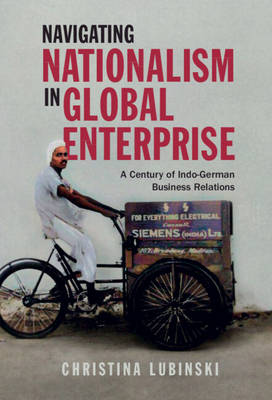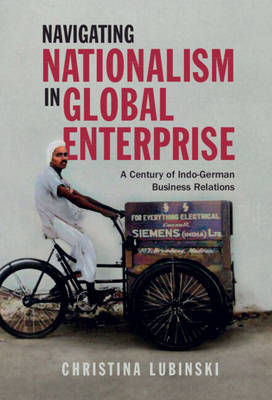
Door een staking bij bpost kan je online bestelling op dit moment iets langer onderweg zijn dan voorzien. Dringend iets nodig? Onze winkels ontvangen jou met open armen!
- Afhalen na 1 uur in een winkel met voorraad
- Gratis thuislevering in België vanaf € 30
- Ruim aanbod met 7 miljoen producten
Door een staking bij bpost kan je online bestelling op dit moment iets langer onderweg zijn dan voorzien. Dringend iets nodig? Onze winkels ontvangen jou met open armen!
- Afhalen na 1 uur in een winkel met voorraad
- Gratis thuislevering in België vanaf € 30
- Ruim aanbod met 7 miljoen producten
Zoeken
Navigating Nationalism in Global Enterprise
A Century of Indo-German Business Relations
Christina Lubinski
€ 144,45
+ 288 punten
Omschrijving
Navigating Nationalism in Global Enterprise analyzes the role of nationalism in global business strategy, showing how multinationals act not just as drivers of globalization but also as sophisticated operators in a world of nations. Using the case study of German companies in colonial and post-colonial India, Christina Lubinski traces how nationalism's influence on business competitive strategies changed over the twentieth century and across major political turning points, such as two world wars and India's transition to independence. She highlights how national imaginings are both relational because they derive from comparisons with other nations, and historical because they mobilize the past to legitimize future aspirations. Lubinski stresses that learning from the past is how multinationals engage strategically with the content of nationalism - i.e., a nation's history, aspirations, and relationships with other nations. In India, German companies' competitiveness was continuously dependent on navigating nationalism and on understanding that nationalism and globalization are inextricably linked.
Specificaties
Betrokkenen
- Auteur(s):
- Uitgeverij:
Inhoud
- Aantal bladzijden:
- 300
- Taal:
- Engels
- Reeks:
Eigenschappen
- Productcode (EAN):
- 9781316511282
- Verschijningsdatum:
- 3/11/2022
- Uitvoering:
- Hardcover
- Formaat:
- Genaaid
- Afmetingen:
- 152 mm x 229 mm
- Gewicht:
- 566 g

Alleen bij Standaard Boekhandel
+ 288 punten op je klantenkaart van Standaard Boekhandel
Beoordelingen
We publiceren alleen reviews die voldoen aan de voorwaarden voor reviews. Bekijk onze voorwaarden voor reviews.











